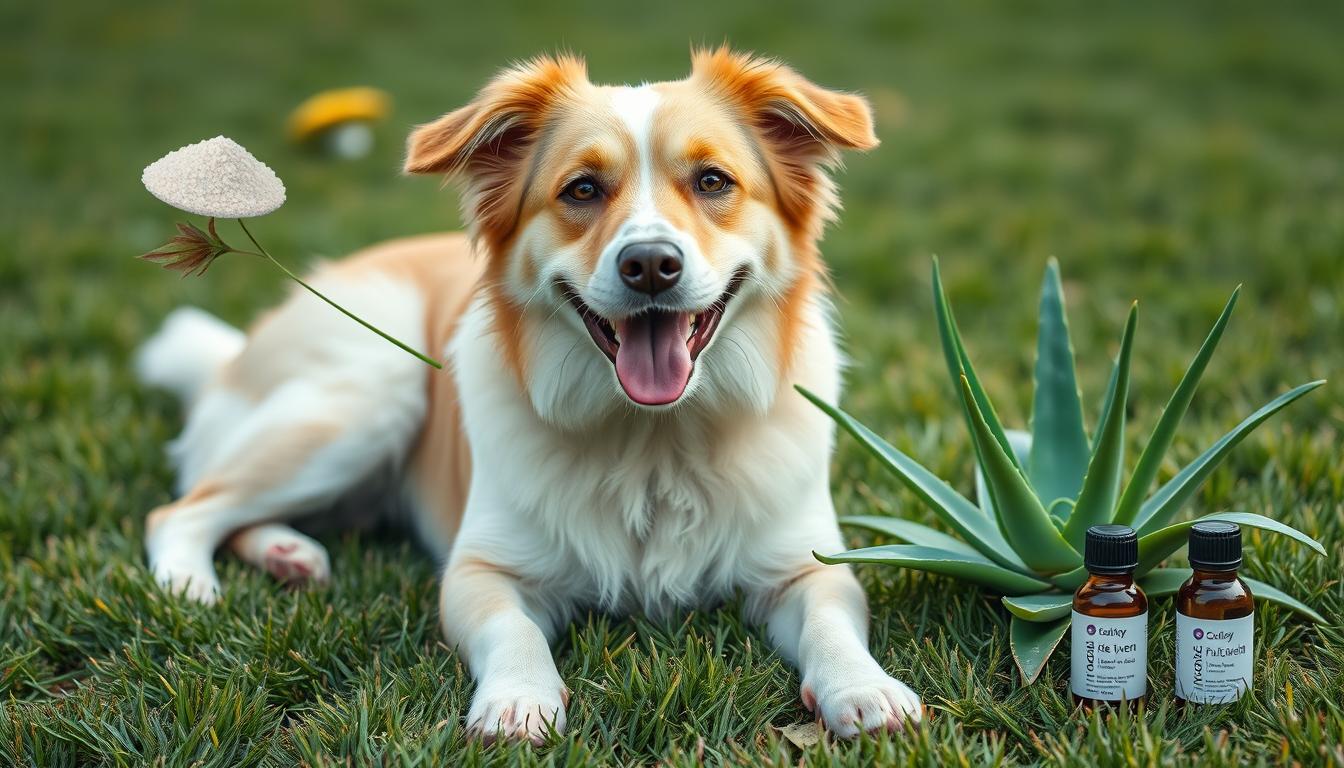Watching your dog suffer from itchy skin is tough. Allergies in dogs require a special plan. Pruritus shows there may be deeper health problems. Luckily, you can help soothe their skin with the right treatment and advice, easing your worry.
The American Kennel Club lists 43 possible causes, including food allergies and flea bites. You might need a mix of modern and natural remedies. This way, you’ll find a good treatment plan.
We explore effective solutions, like omega-rich fish oil and oatmeal baths. Consulting vets for medicines or trying preventive steps is also key. This guide helps you find the best way to comfort your itchy dog.
Key Takeaways
- Learn about the many causes of itchy skin and get vet help for treatment.
- Try natural remedies like chamomile and aloe vera for easing skin allergies.
- See how nutrition and fish oils help skin health and allergy relief.
- Look at how your home and grooming affect your dog’s allergies.
- Stay up-to-date on products that offer quick relief from skin irritation.
Understanding the Itch: Common Causes of Allergies in Dogs
Has your dog been scratching a lot, showing signs of redness, or seeming uncomfortable? They might be reacting to allergies. These allergies in dogs come from various causes, like environmental factors or food sensitivities. Knowing these causes is key to managing them well.
Allergic dermatitis is a common allergic reaction in dogs, leading to itching, scratching, and inflammation. This includes Flea Allergy Dermatitis (FAD), the top skin disease in dogs. For those with FAD, it’s crucial to have 100% flea control. This is especially true in warm climates or homes where fleas can live all year.
But, it’s not only fleas that cause problems. Food allergies are important too, but not as common as environmental allergies. Often, proteins in foods are the triggers. These allergies can start at any age. To diagnose food allergies, an elimination diet trial is needed. This trial should last eight to twelve weeks, with a vet-recommended hypoallergenic diet.
- Environmental Allergies: Things like pollen, dust mites, and mold can cause atopic dermatitis in dogs. It usually starts when they’re one to three years old. About 50% of dogs get better with desensitization therapies.
- Contact Allergies: Less often, contact with certain chemicals or materials can lead to allergic reactions. It’s best to avoid these allergens.
Other signs of allergies include frequent ear infections or serious inflammations that could lead to anaphylactic shock, a medical emergency. Treating a dog’s allergies usually involves avoiding allergens, using medicines like antihistamines or corticosteroids, and sometimes, long-term solutions like immunotherapy.
Quick and effective response to these allergies needs a good understanding of their causes. Most importantly, talking to a vet is crucial to find the best treatment and management plan. Every pet is unique, as is their response to different allergens.
The Importance of Veterinary Diagnosis for Itchy Dog Skin
If your dog keeps scratching, shows red spots, or smells bad, it may signal a serious health problem. It’s important to know when to get help, what the diagnosis process looks like, and your options for treatment. These steps are key to helping your dog with itchy skin caused by allergies.
When to Seek Professional Help
Is your dog constantly scratching, biting, or licking their skin? Do you see scabs, hair loss, or changes in skin color? Then it’s time to get a vet’s opinion. Some dog breeds, like French Poodles and West Highland White Terriers, are more at risk for skin issues. Without the right care, these problems can get worse.
Diagnosis: Identifying Specific Allergens
A vet will start by thoroughly examining your dog. They may do allergy tests to find out the exact cause. This can involve looking for reactions to things in the environment like pollen, or to fleas and certain foods. Knowing the exact cause is important to decide on the right treatment.
Treatment: Medication and Therapeutic Options
Treatments vary depending on the diagnosed issue. Common methods include:
- Systemic medications: New drugs like oclacitinib (Apoquel®) or injections such as Cytopoint® focus on the immune responses that cause allergies.
- Antibiotics and antifungals: These help heal infections caused by too much scratching.
- Corticosteroids: They are strong against inflammation but must be used with care because of side effects.
- Diet modification: If food allergies are a problem, your vet might suggest special hypoallergenic food.
Getting to the bottom of what causes chronic itchiness is crucial for your dog’s relief and health. Ongoing or temporary treatments may be needed, depending on the allergy’s cause.
Every step, from figuring out the problem to treatment, helps manage your dog’s condition. With proper vet care, dogs with allergies can have a good, happy life.
Allergies in Dogs (Skin Itch Relief): Tailored Treatment Plans
If your dog has itchy skin from allergies, you need a custom plan. Consulting a veterinary recommended expert can help. They can suggest dog skin allergies treatment and preventive measures. This can greatly improve your dog’s life quality.
Prevention is key in managing dog allergies well. Products like Advantix II™, Seresto® collars, or Bravecto® chews are vital. They shield your dog from mange and other skin-worsening parasites. These products are especially crucial for allergy-prone dogs.
- Omega-3 and Omega-6 Fish Oil Supplements: These supplements fight inflammation well. They soothe itchy, irritated skin when added to your dog’s diet. They also boost immune support, protecting against allergens.
- Hypoallergenic Diet: This diet benefits dogs with food and environmental allergies. It reduces allergen exposure from food, lowering allergic reactions.
- Special Shampoos and Creams: Shampoos and creams with oatmeal, aloe, or hydrocortisone soothe your dog’s skin. They’re great for calming flare-ups.
- Regular Vet Check-ups: Regular vet visits help adjust allergy plans. This ensures treatments keep working over time.
Benadryl or Zyrtec might temporarily ease some symptoms but use them as your vet advises. Avoiding allergens your vet identifies is best. Regular allergy tests, through skin or blood, pinpoint what harms your dog. This info leads to specific treatments, such as allergy shots, which are highly effective for long-term control.
Overall, treating dog skin allergies involves lifestyle, diet, and medical changes. These steps not only reduce your dog’s discomfort but also boost their immune support. This can make allergies less frequent and severe.
Natural Remedies for Dog Allergies and Skin Relief
If your dog has allergies, you want safe and effective relief. Natural remedies for dog allergies are gaining attention for being gentle and having fewer side effects. These natural solutions can ease your dog’s itchy skin.

Coconut oil is praised for its moisturizing effect and how it boosts skin health. Rubbing coconut oil on your dog’s skin creates a soothing layer. It helps with the dryness and flakiness that allergies often bring.
- Chamomile stands out for its anti-inflammatory qualities. It can calm skin when used in baths or as a spray. Especially, a chamomile tea bath soothes irritated skin, easing redness and cooling down hot spots.
- Aloe vera is known for healing skin in humans and is good for dogs too, just make sure it’s pet-safe. It cools and has anti-inflammatory properties that lessen swelling and relieve itching.
Using these natural remedies for dog allergies can make your dog more comfortable and improve their skin health. Nonetheless, always talk to your vet before trying new treatments, particularly for dogs with serious allergies or skin issues. The right strategy can make your pet’s life much happier and more pleasant.
Well-being is about more than just treatments. It also comes from regular care. Pay attention to your dog’s diet and living environment. They need to get all essential nutrients and live in a clean, safe space.
Optimal Dog Grooming Techniques for Allergy Relief
Knowing the right dog grooming methods can keep your dog’s sensitive skin healthy and comfortable. Let’s look at how proper grooming can improve your pet’s life, specifically for relieving allergies.
Bathing Your Dog: Shampoos and Conditioners
Bathing is vital for dog grooming, especially for allergy sufferers. Use a medicated shampoo designed for dogs to ease itchy skin. Pick a shampoo made to boost the skin barrier and ease skin issues.
Look for ingredients like oatmeal and aloe vera. They soothe and moisturize dry skin. A canine-specific conditioner can also preserve the skin’s oils and improve coat health.
Brushing Strategies to Minimize Irritation
Brushing regularly isn’t just about looking good; it spreads natural oils and keeps the skin barrier strong. For those with sensitive skin, soft bristled brushes lessen irritation. Plus, it reduces shedding and cuts down on dander and other allergens.
Hypoallergenic Products for Sensitive Skin
For dogs with sensitive skin, choose hypoallergenic grooming items. These lack harsh chemicals and perfumes that could cause reactions. A hypoallergenic, medicated shampoo cleans well without harming the skin barrier. Hypoallergenic wipes are great for quick cleans, keeping your dog’s coat less allergenic between baths and upping their comfort.
Using these grooming methods makes your dog’s life happier and healthier. It not only eases allergies but also offers a stress-free environment for their wellbeing.
Diet as a Defense Against Canine Skin Irritation
As a pet owner, it’s important to focus on your dog’s diet to keep their skin healthy. Choosing a hypoallergenic dog diet rich in omega-3 fatty acids can help. It reduces skin inflammation and strengthens the skin’s defenses.
For your dog to stay healthy, a balanced diet is key, especially for their skin. Feeding them food that meets AAFCO standards, like formulas for sensitive skin, is beneficial. It’s also vital to include omega-3 fatty acids for their anti-inflammatory benefits and better coat quality.
- Assess your dog’s specific needs: A limited-ingredient diet may be best for dogs with allergies. It helps identify what causes their skin problems.
- Opt for diets rich in antioxidants: Foods with vitamin E and beta-carotene protect your dog’s skin. They prevent damage common in skin issues.
- Consider supplements: Sometimes, fish oil supplements are necessary. They add extra omega-3 fatty acids for healthier skin.
- Keep an eye on your dog’s skin and how it reacts to their diet.
- Talk to a vet to adjust your dog’s diet when needed.
- Remember, seeing results from dietary changes takes time.
Feeding your dog real food with fresh ingredients and few processed additives can help their skin. Brands like Lyka focus on meals that strengthen the skin’s barrier. This prevents skin problems.

Feeding your dog a diet high in omega-3 fatty acids and low in allergens can improve their skin. Choose quality foods that boost skin health. Watch how these changes bring back your dog’s energy and shine.
Environmental Adjustments to Soothe Your Dog’s Skin
Want to make your dog feel better and healthier? Learning to control environmental allergens is important. Here’s how to make a safer, nicer environment for your furry friend.
Humidity Control: Keeping your home’s humidity below 50% helps a lot. It stops dust mites and mold from growing. These are common things that make dogs allergic.
Use a dehumidifier when it gets too humid. Make sure your place is well-ventilated to stop allergens from finding a cozy spot.
- Use a dehumidifier during humid months to maintain optimal indoor humidity.
- Ensure adequate ventilation to prevent damp conditions where allergens thrive.
Protect Against Harsh Weather: Bad weather can make your dog’s skin issues worse. It’s important to shield them from extreme conditions. Both summer and winter weather can harm your dog’s skin.
- During high pollen seasons, limit your dog’s outdoor activities to reduce exposure to allergens.
- After walks, clean your dog’s paws and coat to remove allergens before they can irritate the skin.
- Provide your dog with a canopy or shelter when outside to protect against direct sun exposure and heat.
Keeping your dog’s environment clean and controlled is key to handling allergies. By doing things like cleaning regularly and controlling humidity, you’ll help a lot. This lowers allergy symptoms and boosts your dog’s happiness.
Preventing Dog Skin Allergies: Tips and Tricks
As a dog owner, keeping your furry friend healthy is essential. Preventing skin allergies is crucial for your dog’s well-being. You can do this by using allergy prevention strategies. Also, maintain a consistent grooming routine and get regular veterinary check-ups. These steps reduce the risk of skin conditions for your dog.
First, it’s important to have regular veterinary check-ups. These check-ups can catch skin issues early. That way, they won’t turn into bigger problems. A vet can give you advice and dog skin rash remedies tailored to your pet.
- Consistent Grooming Routine: Bathing and brushing your dog helps remove allergens. Use hypoallergenic shampoos with natural soothing ingredients like oatmeal.
- Allergy Prevention: Keep your home and your dog’s bedding clean. This helps stop allergens from building up.
- Dietary Considerations: Give your dog a balanced diet. Adding Omega-3 fatty acids can help improve their skin health and fight off allergens.
Environmental factors can also trigger allergies. Try to limit your dog’s exposure to things like pollen or dust mites. Knowing what triggers your dog’s allergies helps you manage and prevent them better.
Remember, use over-the-counter dog skin rash remedies with caution. Always consult a vet to make sure they are safe for your dog. Regular veterinary check-ups help keep allergies in check. They also ensure your dog’s overall health is monitored.
To sum up, using these strategies can help manage and prevent dog allergies. This leads to a healthier, happier life for your pet. Keep up with a consistent grooming routine, stay on top of allergy prevention, and ensure regular veterinary check-ups. Your dog will then be free from the discomfort of itchy skin.
Over-the-Counter Solutions for Immediate Itch Relief
Seeing your dog scratch or lick themselves a lot can make you want to find a fast solution. Over-the-counter (OTC) options can quickly ease your dog’s discomfort. It’s key to know about these choices to make life better for your pet.
Antihistamines and Anti-Inflammatory Agents
For sudden itching from allergies, OTC antihistamines are a top choice. Ingredients like diphenhydramine and cetirizine can help with allergy signs. But, it’s wise to talk to your vet about the right dose for your dog.
OTC anti-inflammatory products, like hydrocortisone creams, can also help. They lower swelling and soothe irritated skin spots. This brings quick relief from itches and rashes.
Topical Treatments and Sprays
Using medicated shampoos or sprays with oatmeal or aloe vera can calm itchy skin. These products moisturize the skin and shield it from more irritation. Using them as directed can ease discomfort and stop common allergens from causing problems.
Supplements: Omega-3 Fatty Acids
Adding omega-3 fatty acids to your dog’s diet is great for their skin. Fish oil, rich in omega-3s, lowers inflammation and makes the skin stronger. Taking these supplements regularly can improve skin and coat health, making allergies less of an issue.
Though OTC solutions provide quick relief, they work best alongside other long-term plans. This includes changes to diet, grooming habits, and the home environment. Always watch how your dog reacts to new treatments and see a vet if things don’t get better or if they get worse.
Conclusion
Allergies in dogs are a big problem. They can cause anything from a little itch to serious reactions. Flea allergies make dogs scratch a lot. Pollen, mold, and dust mites also cause problems. Foods like dairy, beef, or wheat can make allergies worse. Choosing the right food for your dog is very important.
Finding out what your dog is allergic to is key. There are many tests, like blood tests or skin tests. Look out for signs of allergies in your dog. These can be hives, watery eyes, or ear infections. There are treatments like Apoquel, Cytopoint, and allergy shots. Regular grooming and special diets help too.
It’s vital to know how much allergies can affect your dog’s life. Up to 30% of dog owners feel stressed by their pets’ skin problems. Treatments like hydrocortisone sprays are helping a lot. Dealing with atopic dermatitis and looking for new treatments is important. Both the dog and the owner need to work together. If your dog’s symptoms get worse, see a vet right away.


